What is an allergic skin reaction (or allergic rash)?
An allergic skin reaction occurs when the skin overreacts to a substance it cannot tolerate. This might include a new cosmetic product, contact with certain plants or wearing certain jewelry. Skin may become red, itchy or slightly swollen. While usually temporary, these symptoms can be uncomfortable.
Where can allergic skin eruptions appear?
Allergic skin eruptions—commonly referred to as rashes—can appear on different areas of the body. Some areas are more frequently affected due to regular exposure to allergens.
- Face: Often exposed to cosmetics and pollutants
- Arms and hands: Frequent contact with soaps and household chemicals
- Legs: Prone to eruptions after contact with plants or irritating fabrics
- Neck: Sensitive skin may react to jewelry metals or perfumes
Each area reacts differently depending on the allergen and individual skin sensitivity.
What are the different types of allergic skin reactions?
Hives
Have you noticed red, swollen patches on your skin that resemble small bumps? It could be hives. You may have even heard the expression “someone gives me hives”—this comes from the fact that these symptoms can appear after a period of intense stress. However, hives, also referred to as hive skin rash or hive skin reactions, can also be caused by a reaction to medication, an insect bite or sudden changes in temperature (such as cold or sun exposure). In any case, hive skin reactions are treatable, but there is currently no preventive treatment available.
Eczema
Very common, eczema is one of the most disruptive allergic skin eruptions, as it can flare up at any time. It typically presents as very dry skin combined with rough patches, often triggering severe itching. This type of skin reaction may result from a dysfunctional skin barrier, as is the case of atopic dermatitis, allowing allergens like pollen or pet dander to penetrate the skin. Eczema is also believed to have hereditary links. Regardless of the cause, people living with eczema should keep their skin well moisturized and be careful with products that come into contact with their skin, including laundry detergents.
What are common triggers of an allergic reaction skin rash?
Insect bite and sting allergies
When an insect bites the skin, it injects venom or another substance that can cause swelling, itching and redness. In most cases, these skin reactions are mild and disappear within a few hours. However, some individuals may develop a severe allergic reaction to the venom of certain insects, such as bees, wasps or hornets. These symptoms can resemble those of food allergies or insect-related allergies. In some situations, it is important to carry an epinephrine injection device (EpiPen®), as these symptoms can be life-threatening.
Latex allergy
In addition to soaps and fragranced products, some people may experience an allergic reaction to latex. Symptoms of this latex allergy can include hive skin rash, allergic rhinitis or even asthma, which can be confusing if the person is unaware of the source of their allergy.
It’s worth noting that even individuals who are not allergic to latex but are frequently exposed to rubber—such as in gloves or certain tools—may develop mild skin irritations. For this reason, latex should be used with caution.
Poison ivy allergy
Poison ivy or ragweed—what’s the difference? It’s important not to confuse these two plants, as they trigger completely different reactions in the body.
Ragweed is known for causing hay fever symptoms like sneezing, nasal discharge and itchy eyes, but it does not affect the skin.
Poison ivy, on the other hand, is a plant that produces a sap responsible for very uncomfortable skin reactions. When the skin comes into contact with this sap—either directly or indirectly through an animal or object that touched the plant—it may swell, form blisters and become itchy. This type of reaction is irritating but typically resolves within 48 hours or less.
Soap and detergent allergies
Allergic skin reactions caused by soaps and detergents are increasingly common and can be a significant source of discomfort. These allergies and rashes often appear as redness, itching and skin irritation. Chemical ingredients such as fragrances, dyes and preservatives are frequently responsible.
People with sensitive skin are advised to choose hypoallergenic or sensitive-skin products to reduce the risk of reaction. It is also wise to rinse skin thoroughly after using soaps or detergents to remove any potentially irritating residue.
Jewelry allergy
Allergic skin reactions caused by wearing certain types of jewelry are more common than many people think. In fact, a significant number of individuals experience itching, redness or even blisters after their skin comes into contact with specific metals used in jewelry.
Nickel, a metal frequently used in accessories, is often the cause of these uncomfortable reactions. This type of allergy, known as contact dermatitis, can appear a few hours to several days after exposure. To avoid these symptoms, it’s recommended to choose hypoallergenic jewelry made of materials like gold, titanium or stainless steel, which are generally better tolerated by sensitive skin.
Stress
For some individuals, stress can act as a trigger for allergic skin eruptions. When the body is under stress, it releases hormones that can weaken the immune system and amplify allergic symptoms. This may manifest as redness, itching or skin rashes. Learning to manage stress is not only beneficial for mental well-being but also essential for maintaining healthy skin and preventing allergic flare-ups.
How to prevent allergic skin reactions
Prevention starts with paying attention to the products we apply to our skin and the environment we live in. Choosing hypoallergenic products and testing them on a small area of the skin can help reduce the risk of allergic reaction. If a reaction does occur, soothing creams may offer quick relief. However, if symptoms persist, it is recommended to consult a healthcare professional for proper guidance.
How to treat an allergic skin reaction
Treatments for allergic skin eruptions vary depending on the cause. Colloidal oatmeal is an excellent remedy for dryness and itching, and several topical treatments—available over-the-counter or by prescription—can also be found at your pharmacy.
When to consult a pharmacist
It’s important to know when to seek advice from a healthcare professional to obtain an accurate diagnosis and appropriate treatment.
Dermatologists and doctors aren’t the only ones who can help. Pharmacists can also support the management of allergic skin reactions. They are trained to identify the signs and symptoms of these reactions and can prescribe suitable treatments based on your needs. In many cases, these prescriptions are covered by insurance, making the process easier and ensuring faster access to the care you need.
This information is provided for educational purposes only and does not replace the advice of a healthcare professional. Always consult your pharmacist or doctor for personalized care.






